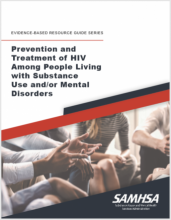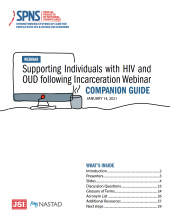
Navigating the HIV and substance use systems of care presents a number of unique challenges, many of which can become more complex depending on a person’s housing, employment, mental health, or economic situation.



Navigating the HIV and substance use systems of care presents a number of unique challenges, many of which can become more complex depending on a person’s housing, employment, mental health, or economic situation.
This guide offers considerations for how state agency staff can develop and maintain an accessible, HIV and opioid use disorder (OUD) service inventory. This guide can be used by state agency HIV and OUD staff to:
The growing opioid crisis across the United States has resulted in an increase in new HIV diagnoses.
This month’s Connecting Care episode discusses the impact of structural racism at the intersection of HIV and OUD care and opportunities to think outside of the box to effect change.
This document provides a quick overview of the federal discretionary funding programs that support essential aspects of the nation’s HIV response.
For Boston Health Care for the Homeless nurse Megan Sonderegger, providing client-centered care means literally meeting her clients where they are.
There are so many factors that impact adherence and health outcomes. During this Connecting Care podcast, Drs. Alex Walley, Jessica Taylor, and Sim Kimmel discuss HIV prevention and treatment among people who inject drugs.
Achieving the goals of the Ending the HIV Epidemic (EHE) Initiative depends on doing more to strengthen communities, reduce the harm associated with drug use, and prevent disease transmission.